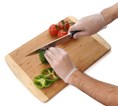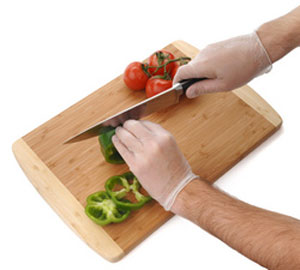Gourmet Gloves Launch New DOP/DEHP Free Food Service Hand Protection Line


Norwood, MA - Long touted as one of the best methods of protecting staff and customers from cross contamination and food born illnesses, food service hand protection is still the most important safeguard in illness protection. But, recent studies have indicated that the TYPE OF MANUFACTURING used in making disposable hand protection is equally, if not more important. Why? Because DEHP, a chemical used in manufacturing vinyl hand protection can cause significant heath risks.
Gourmet Gloves, a division of Atlantic Safety Products, has recently launched DOP/DEHP Free NSF Certified lines of Food Service Hand Protection. Emile Roy, Director of Food Services and Sales, has joined Gourmet Gloves, bringing over 20 year experience in the food service industry. Roy states "Until recently, there was no design or manufacturing standards for food service gloves. However, with the publication of NSF Protocol 155, the food service industry now has a comprehensive specification for food service gloves. These specifications address design, manufacturing, initial qualification standards and ongoing quality. We have standardized our NSF Certified, DOP/DEHP Free Gourmet Gloves to meet these rigorous protocols and to be the best and safest glove available for food service use."
Other disposable vinyl gloves can pose health hazards for consumers because many of them are made with highly toxic phthalates such as di(2-ethylhexyl) phthalate (DEHP). DEHP makes up between 22 and 41 percent of the glove by weight. It is used to make vinyl gloves more flexible. Of particular concern in food-contact applications is the fact that DEHP can leach out of vinyl products, such as disposable gloves, food containers or wrappers. DEHP is particularly soluble in fluids and oil-based products. It can easily contaminate liquids such as drinking water and milk or foods such as cooking oils, cheese, meat and fish.
The dangers of DEHP are well documented in animal studies, which show it can cause testicular damage, suppress or delay ovulation, reduce kidney and liver function, and cause respiratory distress and adverse effects on the heart. Infants, children and pregnant women are much more sensitive than others to such adverse effects, the studies show. In July 2002, the FDA warned that "precautions should be taken to limit the exposure of the developing male to DEHP."
Spurred by concerns about the health hazards posed by food handlers wearing vinyl gloves, Japan has taken decisive action. In 2000, Japan's Department of Food Sanitation, acting on a recommendation by the country's Ministry of Health, Labour and Welfare, issued a directive against the use of vinyl gloves with DEHP in food service kitchens. The Ministry cited research by the Japan National Institute of Health Sciences demonstrating that "The DEHP in foods packed … using vinyl gloves was found to increase drastically when compared with that of the foods before packing" and "the use of PVC [polyvinyl chloride gloves with DEHP caused a sharp increase in the level of this chemical in foods." The danger of phthalates such as DEHP also has led to several initiatives to curb their use in children's toys by the U.S. Consumer Product Safety Commission and the European Commission.
Since the Gourmet Gloves brand of vinyl hand protection contains NO DEHP, they are the safest alternative in any food service application.
SOURCE: Gourmet Gloves
